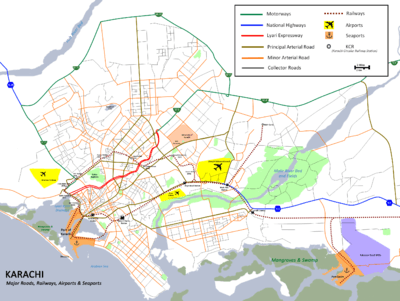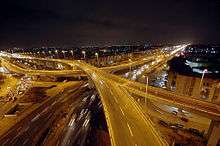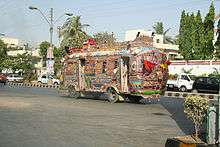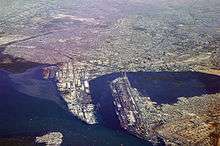Transport in Karachi



The city of Karachi is a major transport hub of Pakistan. The Karachi port and airport are major gateways to Pakistan. The Karachi Railway stations transports the major part of Pakistan's trade with other countries.
Local transport
Minibuses, coaches and large buses (all with a separate compartment for women) typically provide the cheapest way to commute across the city. Rickshaws, chinchis and taxis cater to the travelling needs of upper middle class, while radio cabs or white cabs are frequently used by upper class travellers. This makes it possible for people without their own vehicles to access remote areas of the city.
Auto rickshaws

Taxi cabs
Karachi has three types of taxis: Yellow Taxi, Black Cabs and the Taxi Cab companies. These cab companies are;
Metro Cab (Corolla) Radio Cab (Nhhn) White Cab (Corolla) Red Top (Liana) Pearl Cab (Corolla) Star Cab (Corolla) Pak Cab These cabs are mostly used in airports.
Buses

The people of Karachi use minibuses, coaches, and large buses. They are often cramped and filled to the brim. They are often operated by reckless drivers who do not follow the rules of the road, endangering many. In 2008, the city mayor ordered fifty CNG buses for usage instead of the old minibuses with no fixed routes.
Cars
Many wealthier Karachiites own private cars, Suzuki's Mehran is the most commonly used car followed by Toyota's Corolla.
Goods Transport
Trucks, containers and small suzuki are used to transport goods in Pakistan. There are many goods transporters and forwarders who transport locally by road in all areas of Karachi [1]
Rail transport
Railways
Karachi is linked by rail to the rest of the country by the Pakistan Railways. The Karachi City Station and Karachi Cantonment Railway Station are the city's two major railway stations. The railway system handles a large amount of freight to and from the Karachi port apart from providing passenger services to people travelling up country.
Rapid transit
Plans are underway to extend the intra-city railway system to play a part in the city's mass transit through Karachi Circular Railway system. Currently, primarily motorists and minibuses handle commuter traffic, but there are plans to construct a two Metro train systems in the city called Karachi Metro to decongest the roads and provide quick service to commuters.Five Bus rapid transit systems called Karachi MetroBus are also planned.
Tramways
A number of tramway routes were operated by the Mohamedali Tramways Company in Karachi before 1975.[2][3][4]
Streets, motorways and highways
Lyari Expressway
Lyari Expressway is a highway along the Lyari River in Karachi, Sindh, Pakistan. Lyari Expressway's North bound section is currently under construction, While the South bound corridor is now completed and it was inaugurated for traffic.[5] This toll highway is designed to relieve congestion in the city of Karachi. It will be a 16.5 km expressway that will consist of four lanes on both sides, with two interchanges, five overpasses and five underpasses. Moreover, two lanes each will be constructed on either bank of the Lyari River. Once completed, traffic volume is estimated at 34,000 vehicles. The expressway will have toll plazas at four locations.[6]
Karachi Northern Bypass
Karachi Northern Bypass (M10) begins north of Karachi at the end of Mohammad Ali Jinnah Road, near the junction of the M9. It then continues north for a few kilometers before turning west, where it forms an interchange with the N25. After this interchange it eventually turns south back towards Karachi and merges onto the KPT Flyover at Karachi Port.
Super Highway
The Super Highway (M9) or Malir Motorway begins north of Karachi at the end of Mohammad Ali Jinnah Road, near junction of Karachi Northern Bypass (also known as M10). It is connected with the Karachi Northern Bypass with a trumpet interchange. Then it continues out of the city. From there it continues on a northeast track and forms a junction with the N5 via a link road. Once out of Karachi it enters the desert of Thar. The motorway ends outside of Hyderabad, in the suburban town of Kotri with a coverleaf interchange. From there it merges onto the N5.
Makran Coastal Highway
The Makran Coastal Highway connects Karachi with Gwadar. Makran Coastal Highway is located primarily in Balochistan, Pakistan. It follows the Arabian Sea coast from Karachi to Gwadar. It is also referred to as National Highway 10 or N10.
Waterways

Two ferries operate between Kemari and Manora Island named after Arfa Karim and Afza Altaf daily.[7] Besides these, hundreds of boats operate between Kemari and Manora daily.
Karachi-Mumbai Ferry Service operated until 1965. The ferry service played an important role of transporting Muslim refugees from India to Pakistan while bringing Hindu and Sikh refugees to India.[8]
Pipelines
White Oil Pipeline
The White Oil Pipeline (White Oil Pipeline Project (WOP)) carries imported oil from Port Qasim to Pak-Arab Refinery Limited (PARCO) at Mehmood Kot, Muzaffargarh, Punjab[9]
Sui Gas Pipeline
The Sui Gas Pipeline carries natural gas from Sui gas fields in Sui, Balochitan to Karachi, Sindh.
Ports and harbours
The largest shipping ports in Pakistan are the Port of Karachi and the nearby Port Qasim. These seaports have modern facilities and not only handle trade for Pakistan, but also serve as ports for Afghanistan and the land-locked Central Asian countries. Plans have been announced for new passenger facilities at the Port of Karachi.[10]
Port of Karachi

The Port of Karachi is Pakistan's largest and busiest seaport, handling about 60% of the nation's cargo (25 million tons per annum). The port is located between the towns of Kiamari and Saddar, close to the heart of old Karachi, the main business district, and several industrial areas. The geographic position of Karachi places the port close to major shipping routes such as the Strait of Hormuz. The administration of the port is carried out by the Karachi Port Trust which was established in the nineteenth century.
Port Qasim
The Port Muhammad Bin Qasim is a port in Karachi, Sindh, Pakistan on the coastline of the Arabian Sea. It was constructed in the late 1970s to relieve congestion at Karachi Port. The port was developed close to the Pakistan Steel Mills complex near the Indus River delta. Port Qasim's residential area is a neighbourhood of Bin Qasim Town of Karachi.
Air transport

The Jinnah International Airport of Karachi is the largest and busiest airport of the country. It handles 10 million passengers a year. The airport also receives the largest number of foreign airlines, a total of 27 airlines fly to Jinnah International predominantly from the Middle East and South East Asia. All of Pakistan's airlines use Karachi as their primary hub including Pakistan International Airlines, airblue and Shaheen Air.
The city's old airport terminals are now used for Hajj flights, cargo facilities, and ceremonial visits from heads of state. U.S. Coalition forces used the old terminals for their logistic supply operations as well. The city also has two other airstrips used primarily by the armed forces.
See also
- Transport in Pakistan
- Jinnah International Airport
- Auto rickshaw
- Pakistan Civil Aviation Authority
- Makran Coastal Highway
- Port of Karachi
- Port Qasim
- Karachi Cantonment Railway Station
- National Highway Authority
- Lyari Expressway
- Karachi Northern Bypass
- Super Highway
- Karachi Transport Ittehad
References
- ↑ PLDB. "All Pakistan Goods Transport". Appxone. Retrieved 3 November 2014.
- ↑ "History of Karachi- Showing trams". Retrieved 2009-10-29.
- ↑ "History of Karachi". Retrieved 2009-10-29.
- ↑ Jang 4 April 2010
- ↑ http://pakistaniat.com/2008/02/11/lyari-expressway-south-bound-inaugurated/
- ↑ "Lyari Expressway Plan Reviewed" 24 April 2004, Dawn
- ↑ The News International - Kemari--Manora ferry service sets sail
- ↑ Mumbai-Karachi: An ancient link
- ↑ Pak-Arab Refinery's oil pipeline operations
- ↑ "Projects". Karachi Port Trust. Retrieved 2007-11-19.